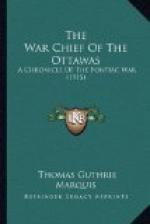There is still to record the closing act in the public career of Pontiac. Sir William Johnson, fearing that the Ottawa chief might fail to keep his promise of visiting Oswego to ratify the treaty made with Croghan at Detroit, sent Hugh Crawford, in March 1766, with belts and messages to the chiefs of the Ottawa Confederacy. But Pontiac was already preparing for his journey eastward. Nothing in his life was more creditable than his bold determination to attend a council far from his hunting-ground, at which he would be surrounded by soldiers who had suffered treachery and cruelty at his hands—whose comrades he had tortured and murdered.
On July 23 there began at Oswego the grand council at which Sir William Johnson and Pontiac were the most conspicuous figures. For three days the ceremonies and speeches continued; and on the third day Pontiac rose in the assembly and made a promise that he was faithfully to keep: ‘I take the Great Spirit to witness,’ he said, ’that what I am going to say I am determined steadfastly to perform... While I had the French king by the hand, I kept a fast hold of it; and now having you, father, by the hand, I shall do the same in conjunction with all the western nations in my district.’
Before the council ended Johnson presented to each of the chiefs a silver medal engraved with the words: ’A pledge of peace and friendship with Great Britain, confirmed in 1766.’ He also loaded Pontiac and his brother chiefs with presents; then, on the last day of July, the Indians scattered to their homes.
For three years Pontiac, like a restless spirit, moved from camp to camp and from hunting-ground to hunting-ground. There were outbreaks of hostilities in the Indian country, but in none of these did he take part. His name never appears in the records of those three years. His days of conspiracy were at an end. By many of the French and Indians he was distrusted as a pensioner of the British, and by the British traders and settlers he was hated for his past deeds. In 1769 he visited the Mississippi, and while at Cahokia he attended a drunken frolic held by some Indians. When he left the feast, stupid from the effects of rum, he was followed into the forest by a Kaskaskia Indian, probably bribed by a British trader. And as Pontiac lurched among the black shadows of the trees, his pursuer crept up behind him, and with a swift stroke of the tomahawk cleft his skull. Thus by a treacherous blow ended the career of a warrior whose chief weapon had been treachery.




